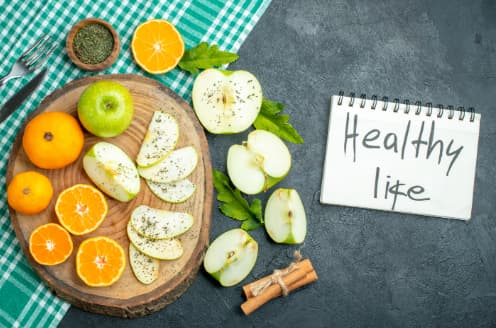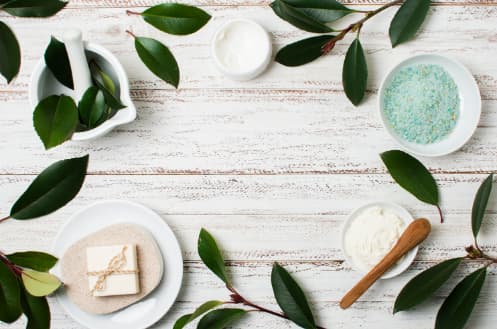The role of nutrition: key vitamins and minerals for glowing skin
Nutrition plays a crucial role in maintaining healthy skin. The foods we consume can have a direct impact on our skin’s appearance and condition. Key vitamins and minerals are essential for skin health.
- Vitamin C: This powerful antioxidant helps protect the skin from damage caused by free radicals and promotes collagen production, which is vital for skin elasticity and firmness. Foods rich in vitamin C include citrus fruits, strawberries, bell peppers, and broccoli.
- Vitamin E: Another antioxidant, vitamin E helps combat oxidative stress and can protect the skin from sun damage. It can be found in nuts, seeds, and leafy greens.
- Omega-3 Fatty Acids: These essential fatty acids help maintain the skin’s lipid barrier, keeping it hydrated and reducing inflammation. Foods such as fatty fish (like salmon and mackerel), walnuts, and flaxseeds are excellent sources.
- Zinc: This mineral plays a vital role in skin repair and regeneration. It helps control oil production and can aid in healing acne and other skin conditions. Foods high in zinc include oysters, meat, beans, and whole grains.
- Antioxidant-Rich Foods: Incorporating a variety of colorful fruits and vegetables into your diet can provide a broad range of antioxidants that protect your skin and promote overall health. Berries, leafy greens, and sweet potatoes are particularly beneficial.
Hydration matters: the importance of water for skin health
Staying hydrated is fundamental to maintaining healthy skin. Water helps to flush out toxins, deliver nutrients to skin cells, and maintain elasticity. Dehydrated skin can appear dull, flaky, and more prone to wrinkles.
- Daily Water Intake: It’s generally recommended to drink at least eight 8-ounce glasses of water a day, but individual needs may vary based on activity level, climate, and personal health.
- Hydrating Foods: Incorporating foods with high water content, such as cucumbers, oranges, and watermelons, can also contribute to hydration and improve skin moisture levels.
- Signs of Dehydration: If your skin feels tight or looks dry and flaky, it may be a sign that you’re not drinking enough water. Pay attention to your body’s signals and adjust your fluid intake accordingly.
The impact of stress: how mental well-being affects your skin
Stress can significantly affect your skin’s condition. When you’re stressed, your body produces cortisol, a hormone that can lead to increased oil production and, consequently, breakouts.
Stress-Induced Skin Conditions: Conditions like acne, eczema, and psoriasis can flare up during periods of high stress. Managing stress through relaxation techniques, such as yoga, meditation, or deep breathing exercises, can benefit your skin.
Holistic Approach: A holistic approach that includes a balanced diet, regular exercise, and adequate sleep can help mitigate the effects of stress on your skin. Activities that promote relaxation can improve your overall well-being and lead to healthier skin.
Sleep and skin: the connection between rest and radiance
Quality sleep is essential for maintaining healthy skin. During sleep, your body goes into repair mode, regenerating cells and producing collagen, which helps maintain skin elasticity and firmness.
The Importance of Sleep: Lack of sleep can lead to increased stress hormones, resulting in dull skin, dark circles under the eyes, and a higher likelihood of breakouts. Aim for 7-9 hours of quality sleep each night.
SleepHygiene: Establishing a good sleep routine, such as going to bed and waking up at the same time each day, can help improve your sleep quality. Creating a calming bedtime environment and avoiding screens before bed can also contribute to better rest.

Lifestyle choices: the effects of smoking, alcohol, and sun exposure on skin
Your lifestyle choices can have a significant impact on your skin’s appearance and health. Smoking and excessive alcohol consumption can lead to premature aging and various skin issues.
- Smoking: The toxins in cigarettes can damage collagen and elastin, leading to wrinkles and a dull complexion. Quitting smoking can have immediate benefits for your skin. For those seeking alternatives, consider switching to e-cigarettes instead of traditional cigarettes. E-cigarettes, like those available at Doctor Vape, can be a less harmful option for those looking to quit smoking, providing a way to reduce exposure to harmful chemicals.
- Alcohol: While moderate alcohol consumption may have some benefits, excessive drinking can dehydrate your skin and lead to inflammation. Limiting alcohol intake can help maintain a healthy, glowing complexion.
- Sun Exposure: Protecting your skin from harmful UV rays is crucial for preventing premature aging and skin cancers. Use broad-spectrum sunscreen daily, wear protective clothing, and seek shade when the sun is strongest.


